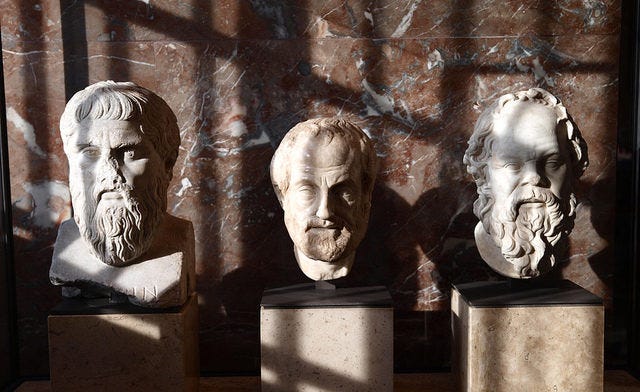Wisdom is more important than knowledge
With the tremendous advancements in science human beings have reached the technological capacity to exterminate themselves and their world. In fact, at least one time we came pretty close to a nuclear war. Over the past decades, with the rise of the environmental movement, we’ve become ever more aware of the impact we have not only on the health and well-being of our own communities but on the planet as a whole.
It is, therefore, no secret that we currently have the know-how to radically change the world.
The crucial question, therefore, is not whether we can change the world. It is whether we are wise enough to act towards making it better, given that scientific know-how does not in itself make us wiser.
“Shall we be more precise? Science is analytical description, philosophy is synthetic interpretation. Science wishes to resolve the whole into parts,the organism into organs, the obscure into the known. It does not inquire into the values and ideal possibilities of things, nor into their total and final significance; it is content to show their present actuality and operation, it narrows its gaze resolutely to the nature and process of things as they are. The scientist is as impartial as Nature in Ivan Turgenev’s (1818-1883) poem; he is as interested in the leg of a flea as in the creative throes of a genius. But the philosopher is not content to describe the fact; he wishes to ascertain its relation to experience in general and thereby to get at its meaning and its worth; he combines things in a interpretive synthesis; he tries to put together, better than before, that great universe-watch which the inquisitive scientist has analytically taken a part. Science tells us how to heal and how to kill; it reduces the death rate in retail and then kills us wholesale in war; but only wisdom – desire coordinated in the light of all experience – can tell us when to heal and when to kill. To observe processes and to construct means is science; to criticize and coordinate ends is philosophy: because in these days our means and instruments have been multiplied beyond our interpretation and synthesis of ideals and ends, our life is full of sound and fury, signifying nothing. For a fact is nothing except in relation to desire; it is not complete except in relation to a purpose and a whole. Science without philosophy, facts without perspective and valuation, cannot save us from havoc and despair. Science gives us knowledge, but only philosophy can give us wisdom.”1
“Philosophy?” someone may wonder in puzzlement. Could it be that such a seemingly outdated discipline may be required to play such an important role? Besides:
“What is the task of philosophy today? We know the familiar answer: None – for it is just the private business of a guild of specialists. These philosophers, we are told, occupy university chairs dating from the Middle Ages and meet in futility, at conventions which are the modern occasions for showing off. Their monologues are attested by a voluminous literature, scarcely read and rarely bought, except for a few fashionable publications with snob appeal. If the press, as the organ of public opinion, takes note of these books and periodicals which gather dust in libraries, it does so without real interest. All in all, we hear, philosophy is superfluous, ossified, behind the times, waiting only for its disappearance. It no longer has a task”2.
Jaspers, however, did not end that thought on philosophy with that paragraph, but with this one:
“Against such strictures we may point out, first of all, that not everything which goes by the name of philosophy should be confused with philosophy itself. Philosophy exists wherever thought brings men to an awareness of their existence. It is omni-present without being specifically identified. For no man thinks without philosophizing – truly or falsely, superficially or profoundly, hastily or slowly and thoroughly. In a world where standards prevail, where judgments are made, there is philosophy. There is as much of it in the cohesive faith of the Church as in a conscious, self-contained philosophical faith; there is philosophy even in the belief of the unbeliever, in nihilistic disintegration, in Marxism, psychoanalysis, in the many precepts for living that are not popular, such as anthroposophy and others [a contemporary example could be what may be roughly called ‘New Age’ philosophies]. The very rejection of philosophy goes back to a philosophy that is not aware of itself.”3
Perhaps it is time we become aware and do our best to recover and champion the traditional role of philosophy which is the development of wisdom, not just in our words and heads, but in our hearts and actions. It is time for the philosopher, as an ideal, to come out of his academic cave and return to the market (agora), where he was originally born, to help his fellow humans live a better life, leading by example.
Will Durant, The Story of Philosophy, p.2-3, Simon & Schuster Paperbacks, 1961.
Karl Jaspers, Basic Philosophical Writings, “The Present Task of Philosophy”, p.125, ed. and trans. by E. Ehrlich, L.H. Ehrlich and G. B. Pepper, Humanities Press, 1994.
Karl Jaspers, Basic Philosophical Writings, “The Present Task of Philosophy”, p.125, ed. and trans. by E. Ehrlich, L.H. Ehrlich and G. B. Pepper, Humanities Press, 1994.


